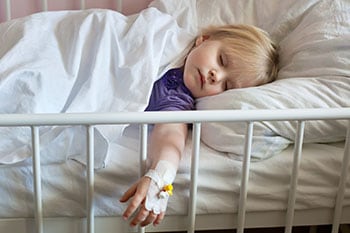Key points
- Measles is a highly contagious disease that can lead to serious complications.
- Symptoms usually begin 7 to 14 days after infection.
- Measles can be dangerous, especially for babies and young children.

Signs and symptoms
Seek care immediately!
Measles isn't just a little rash. Measles can be dangerous, especially for babies and young children.
7–14 days after a measles infection: first symptoms show
Measles symptoms appear 7 to 14 days after contact with the virus. Measles typically begins with:
- High fever (may spike to more than 104°)
- Cough
- Runny nose (coryza)
- Red, watery eyes (conjunctivitis)
2–3 days after symptoms begin: Koplik spots
Tiny white spots (Koplik spots) may appear inside the mouth two to three days after symptoms begin.
3–5 days after symptoms begin: measles rash
Measles rash appears 3 to 5 days after the first symptoms. It usually begins as flat red spots that appear on the face at the hairline. They then spread downward to the neck, trunk, arms, legs, and feet.
- Small raised bumps may also appear on top of the flat red spots.
- The spots may become joined together as they spread from the head to the rest of the body.
- When the rash appears, a person's fever may spike to more than 104° Fahrenheit.
Complications
Common complications from measles are:
- Ear infections occur in about 1 out of every 10 children with measles.
- Diarrhea is reported in less than 1 out of 10 people with measles.
Who is at risk
Measles can be serious in all age groups. However, there are several groups that are more likely to suffer from measles complications:
- Children younger than 5 years of age
- Adults older than 20 years of age
- Pregnant people
- People with weakened immune systems, such as from leukemia or HIV infection
Prevent measles & get vaccinated!
Severe complications in children and adults
Some people may suffer from severe complications, such as pneumonia (infection of the lungs) and encephalitis (swelling of the brain). They may need to be hospitalized and could die.
- Hospitalization. About 1 in 5 unvaccinated people in the U.S. who get measles is hospitalized.
- Pneumonia. As many as 1 out of every 20 children with measles gets pneumonia, the most common cause of death from measles in young children.
- Encephalitis. About 1 child out of every 1,000 who get measles will develop encephalitis (swelling of the brain). This can lead to convulsions and leave the child deaf or with intellectual disability.
- Death. Nearly 1 to 3 of every 1,000 children who become infected with measles will die from respiratory and neurologic complications.
- Complications during pregnancy. If you are pregnant and have not had the MMR vaccine, measles may cause birth prematurely, or have a low-birth-weight baby.
Long-term complications
Subacute sclerosing panencephalitis (SSPE) is a very rare, but fatal disease of the central nervous system. It results from a measles virus infection acquired earlier in life.
About SSPE
- SSPE generally develops 7 to 10 years after a person has measles, even though the person seems to have fully recovered from the illness.
- Since measles was eliminated in 2000, SSPE is rarely reported in the United States.
- Among people who contracted measles during the resurgence in the United States in 1989 to 1991, 7 to 11 out of every 100,000 were estimated to be at risk for developing SSPE.
- The risk of developing SSPE may be higher for a person who gets measles before they are 2 years of age.
